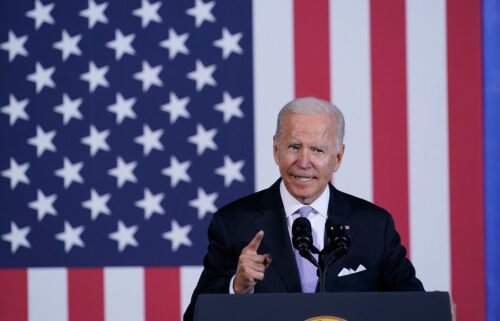In Capitol riot cases, judges split on whether to keep defendants in jail before trial

The Tennessee man covered in black armor who lunged across seats in the US Senate carrying plastic handcuffs during the insurrection at the US Capitol won’t walk free as he awaits his court hearings. Neither will the Arkansan who put his feet on House Speaker Nancy Pelosi’s desk and allegedly had his wife take guns out of the house before his arrest, nor the Alabaman who says he was inspired by God as he walked the floor of the Senate, bleeding.
But a New Mexico official and “Cowboy for Trump” who announced at a county council meeting he’d return to Washington, DC, for President Joe Biden’s inauguration with guns in his car, and a man who brought a 3-inch pocketknife to a meeting with his pretrial officer will be released, judges have decided.
A federal judge, reviewing the knife incident, told defendant Gabriel Augustin Garcia that he was “lucky” on Wednesday. He remains released, on a curfew and with a GPS monitor.
Luck isn’t all that’s needed, as a majority of the more than 220 US Capitol riot defendants are released from jail as they await trial.
The law sets a high bar for federal judges to keep defendants behind bars before a conviction, with only certain types of violent crimes making detaining defendants necessary. So it’s an alchemy of history and future threats that judges consider when deciding whether to detain or release alleged rioters. They look at each person’s individualized histories and weigh the likelihood they might flee, destroy evidence or be violent toward others.
“It really gets down to whether they’re going show up for trial, and if they’re going to harm anybody,” said Chris Maloney, a consultant to the federal judiciary who previously led the probation offices for the Massachusetts and New Jersey federal courts. “Even if they stormed the Capitol, but were a model citizen? You can’t pile all those conditions on them, if they have strong ties to the community.”
The decisions on detentions have become a Rorschach test for judges across the country as they see defendants charged with taking part in the January 6 riot.
Several magistrate judges in various states have split with the Justice Department’s requests to hold in jail alleged rioters, and a handful of detention decisions are now headed for appeals. And some Washington, DC-based judges have reacted more harshly to the actions of rioters than judges in their home states.
From court to court
In a few cases, like that of Couy Griffin, the official from New Mexico; Richard Barnett, the man in Pelosi’s office; and Eric Gavelek Munchel, the infamous “zip-tie” man, judges in DC have reversed lower-court judges’ rulings.
Judge Royce Lamberth of the DC District Court wrote in Munchel’s case Wednesday that he “poses a clear danger to our republic.” He said the same about Munchel’s mother, who also had picked up zip tie-like restraints within the Capitol and wore body armor on January 6. The mother — Lisa Eisenhart, a traveling nurse in Georgia — had said in an interview after January 6 she would “rather die” in a revolution than be oppressed, a statement so bold Lamberth said she would be a risk to the community if released.
“If Eisenhart does not fear the ultimate consequence, the consequences for disobeying release conditions are unlikely to deter her,” the judge wrote.
Munchel and Eisenhart are now appealing Lamberth’s decision. They have both pleaded not guilty to their charges.
It’s possible their arguments for release from jail could work. Eisenhart has no criminal history, and the charges she faces aren’t so severe they merit automatic jailing.
And having the case bounce from courtroom to courtroom could work in her favor as well. Regarding her release, a magistrate judge in Tennessee previously decided the mother-son pair was not violent, Munchel “respected” law enforcement and Eisenhart wasn’t a danger to the community.
“You talk about regional differences — you go two courtrooms down, and strikingly different things can happen,” Maloney said. “From district to district, it just varies widely.” Even within the same case before the same judge, Maloney said, each defendant may be treated differently because of their record, which is reviewed by court probation officials without looking at the evidence of the current case they face. Judges then decide based on those officials’ recommendations, the arguments made by the legal teams in court, and their own interpretation of the law.
Maloney described how a single criminal case could bring in almost 30 gang members, but once the court looks at them individually, a few gang members could be released.
In fact, a report from the federal judiciary in 2018 found that public order and property crimes — the types of offenses many of the Capitol riot defendants face — largely resulted in a defendant being released before trial. Violent crimes and firearms offenses largely resulted in detention, which is so far mostly consistent with how detention decisions related to January 6 have been made. The Capitol riot defendants who are charged with, for example, assaulting police have stayed behind bars for the most part.
The price of bail
A CNN review of many of the Capitol riot cases shows that even among the released defendants, judges have taken widely varied approaches.
In federal district courts across the country, the defendants who are arrested then released don’t have monetary amounts for bail set, and instead are told to return to court on their own promise, called personal recognizance.
A handful have been given bail amounts of $10,000 or $25,000. But in the busy court of the Eastern District of New York, which includes parts of New York City and Long Island, a judge set two Capitol riot defendants’ bail at $250,000 each.
When the two men’s cases — both about allegations of them violently entering the Capitol grounds in the crowd — were moved to DC, the Justice Department and judges in DC agreed they could be released without set bail amounts.
Bleeding rioter compared to others
At least one defendant, Joshua Black of Alabama — who said on YouTube he wanted to “plead the blood of Jesus” in the Capitol and, indeed, was bleeding from his cheek when he was photographed on the floor of the Senate — had his attorney argue to a judge in Alabama that defendants in the riot cases weren’t being treated equitably. Black had admitted on video having a knife on him that day in the riot, because he works outside, he said, not because he wanted to use it.
Black’s defense attorney had drawn up a chart showing how another rioter wore a “Camp Auschwitz” sweatshirt in the Capitol but was released on personal recognizance, as was a woman who held a sign that said “Children Cry Out for Justice” while she photographed a rioter in the vice president’s chair, according to filings in Black’s case in Alabama.
Those other defendants, Robert Packer and Christine Priola, face similar charges to Black.
The judge in Alabama, John England III, deemed Black a possible danger to the community if he were to be released, so he is still behind bars. Black says he plans to appeal the Alabama federal judge’s detention ruling, and is set to have his first court appearance in DC next week, according to his court record. Packer and Priola won’t be back in court for several more days, either.
In recent weeks, another released defendant who has pleaded not guilty, Texas florist Jenny Cudd, caught the public’s attention, after she was allowed to travel to Mexico on a “bonding” retreat for her employees. As luxe as that trip sounds, it’s not uncommon for judges to allow defendants awaiting trial to travel out of the country if they are deemed not to be a flight risk.
“In fact, it’s pretty common,” Maloney said.
In DC, the terror of the siege has landed hard in court arguments.
After an Arkansas judge agreed to release Barnett — who made foul remarks about Pelosi to the Washington Post — Judge Beryl Howell, the chief of the DC District Court, noted she could still see National Guard protecting the Capitol from her chamber’s windows at the court. She characterized Barnett’s part in the riot and subsequent behavior as “brazen, entitled, dangerous,” during a hearing about his detention.
“We’re still living here in Washington, DC, with the consequences of the violence that this defendant is alleged to have participated in,” Howell said, castigating Barnett three weeks ago. The names of his charges, she added — seven counts including theft of government property, parading in a Capitol building, disorderly conduct and entering restricted grounds with a stun gun — “don’t even properly capture the scope of what Mr. Barnett is accused of doing here.”
He has pleaded not guilty.



